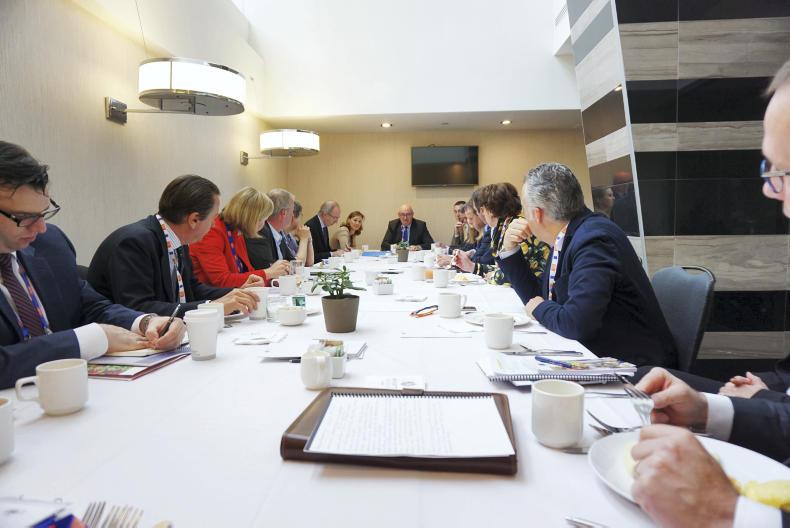European Commissioner for Agriculture Phil Hogan told delegates on the mission that the EU was working to resolve technical issues around the 18,500t cheese quota that the EU will be given under the Canadian free trade deal, CETA.
In particular, they are working on an arrangement that demonstrates transparency on access to the quota and the possibility of 30% of it being reserved for new entrants is being considered. There are also issues around what is described as the Class 7 definition where there is an agreement to sell milk proteins at low cost to processors, favouring domestic production over imports.
Toronto
Hogan began the Canadian leg of his North American visit yesterday with a series of meetings in the capital Ottawa. Today he has moved on to Toronto, where he leads a business delegation from across the EU in a series of events based around the SAIL Toronto food show, which opens today.
Breakfast meeting in #Toronto with EU wines, spirits and beer sector to listen to their perspectives on new opportunities with #CETA pic.twitter.com/5brHnLMSMX
— Phil Hogan (@PhilHoganEU) May 2, 2017
Irish companies participating in the delegation include Ornua, Dawn Meats and Foyle Meats, with Bord Bia’s North American office also taking part. The Scottish levy board, Quality Meat Scotland (QMS), has a stand at the show, where it has product supplied by Dawn’s Scottish factory, Highland Meats Salcoats, which is based in southwest Scotland.
Canadian approval
The commissioner held breakfast briefings for the drinks and dairy industry delegates before travelling to the opening of the show. He updated the dairy industry on progress with the implementation of CETA, the recently agreed trade agreement between Canada and the EU. Although it has gone through all the ratification stages in the EU, it still has to be approved by the Canadian parliament, which is hoped to be achieved before the summer recess. Then the agreement can take effect provisionally while it awaits ratification by the individual EU member states.
Meeting #EU dairy sector on our #EUAgriPromo mission to #Toronto this morning - lots of possibilities for dairy sector in #CETA pic.twitter.com/azDsQxaGSn
— Phil Hogan (@PhilHoganEU) May 2, 2017
Issues
Other issues under CETA include standards for cheese production that periodically threaten to exclude some products, but the commissioner was confident these would be resolved. Protected food names, or PGIs, were also raised. The commissioner explained that EU PGIs would be recognised, with an exception given on a few categories to Canadian companies who historically used these names in a generic nature.
This would also require clear identification that the product was Canadian where a company was using the PGI name because of historical entitlement.
There is a quota arrangement for dairy only in CETA, with beef and pork having free access while for Canadian exports to the EU the opposite applies. Beef and pork will come into the EU under quota while dairy has free access.
Keep an eye on www.farmersjournal.ie for more updates from the mission to Canada.






 This is a subscriber-only article
This is a subscriber-only article










SHARING OPTIONS: